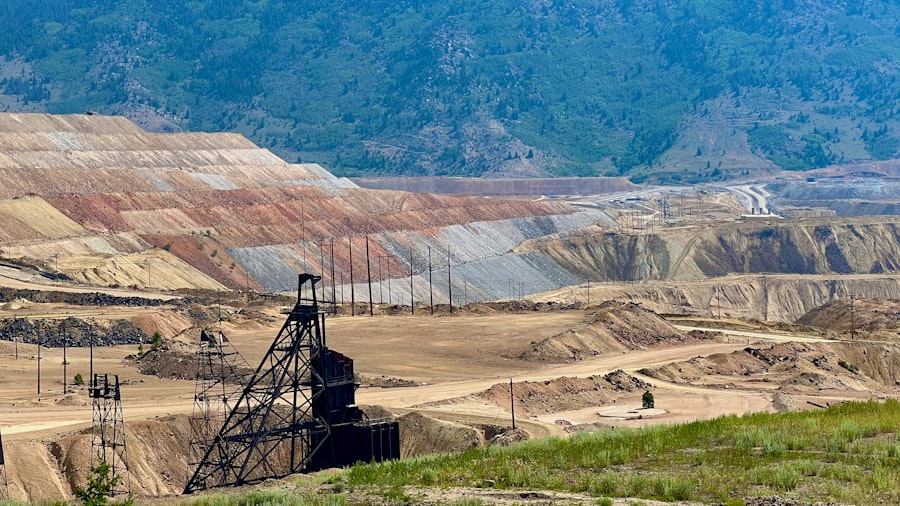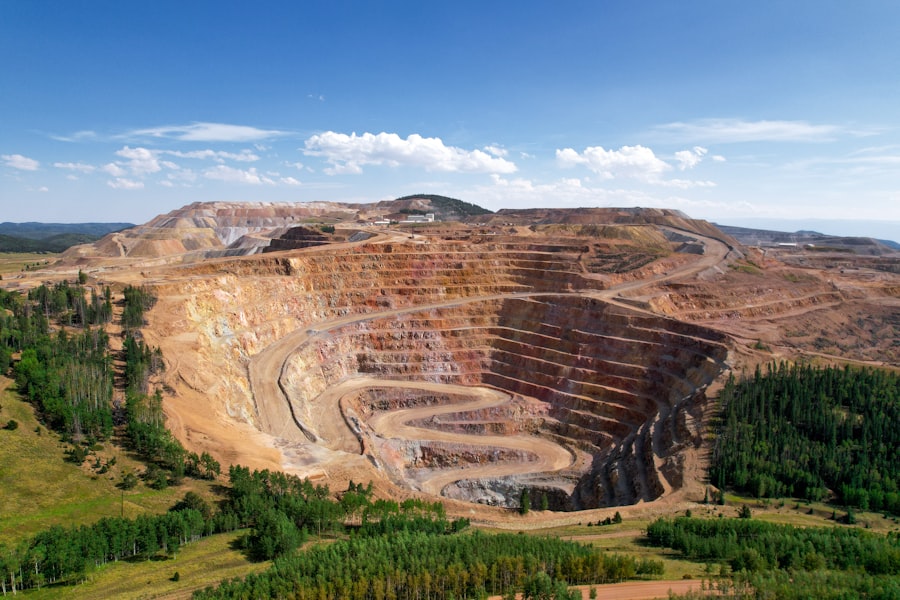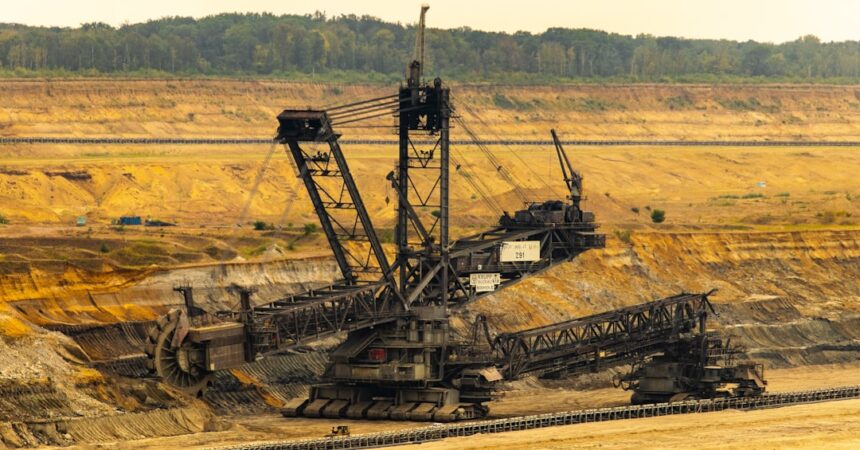Africa Corps, a prominent player in the continent’s economic landscape, has emerged as a significant entity in various sectors, particularly in mining. Established with the vision of harnessing Africa’s rich natural resources, the organization has positioned itself as a catalyst for development and growth. With a focus on sustainable practices and community engagement, Africa Corps aims to balance profitability with social responsibility.
The organization’s commitment to ethical operations has garnered attention from both local stakeholders and international investors, making it a key player in the mining industry. The mining sector in Africa is characterized by its vast potential and inherent challenges. Africa Corps recognizes the importance of navigating this complex environment to unlock opportunities that benefit not only the company but also the communities in which it operates.
By prioritizing transparency and collaboration, Africa Corps seeks to redefine the narrative surrounding mining in Africa, moving away from exploitation towards a model that promotes shared prosperity.
Key Takeaways
- Africa Corps is expanding its presence in Africa’s mining industry by securing valuable mining concessions.
- Obtaining mining concessions is strategically important for Africa Corps’ growth and economic benefits.
- The company faces challenges such as regulatory hurdles and environmental concerns in acquiring mining rights.
- Africa Corps emphasizes responsible mining practices to mitigate impacts on local communities and the environment.
- Future plans include strengthening international partnerships and increasing investments to boost mining operations.
Overview of Mining Concessions in Africa
Mining concessions in Africa represent a critical aspect of the continent’s economic framework. These concessions grant companies the rights to explore and extract valuable minerals and resources, which are abundant across various regions.
The potential for economic growth through mining is immense, as these resources can significantly contribute to national revenues and job creation. However, the landscape of mining concessions is not without its complexities. Issues such as regulatory frameworks, environmental concerns, and social implications often complicate the process.
Many African nations are striving to create a balance between attracting foreign investment and ensuring that local communities benefit from the extraction of their natural resources. As such, mining concessions are often viewed through a dual lens of opportunity and responsibility, necessitating a careful approach from companies like Africa Corps.
Africa Corps’ Expansion into Mining Industry

Africa Corps has strategically expanded its operations into the mining industry, recognizing the sector’s potential to drive economic growth and development. This expansion is not merely a business decision; it reflects a broader commitment to contributing positively to the African economy. By investing in mining, Africa Corps aims to tap into the continent’s rich mineral wealth while fostering sustainable practices that benefit local communities.
The company’s approach to expansion involves thorough research and analysis of potential mining sites, ensuring that they align with both economic viability and ethical considerations. Africa Corps prioritizes partnerships with local governments and communities, understanding that collaboration is essential for long-term success. This strategy not only enhances their operational capabilities but also builds trust and goodwill among stakeholders, positioning Africa Corps as a responsible leader in the mining sector.
Strategic Importance of Securing Lucrative Mining Concessions
| Metric | Description | Strategic Importance | Impact on Business |
|---|---|---|---|
| Resource Availability | Quantity and quality of minerals in concession | High – Determines long-term supply security | Ensures steady production and revenue streams |
| Geopolitical Stability | Political environment of mining region | Medium to High – Affects operational risks | Reduces risk of disruptions and expropriation |
| Regulatory Environment | Mining laws, taxes, and environmental regulations | High – Influences cost and compliance | Impacts profitability and project feasibility |
| Access to Infrastructure | Proximity to roads, ports, and power supply | Medium – Affects operational efficiency | Reduces transportation and operational costs |
| Market Demand | Global demand for mined minerals | High – Drives pricing and investment decisions | Determines revenue potential and growth |
| Competitive Positioning | Number of competitors and concession exclusivity | High – Secures market share and bargaining power | Enhances strategic advantage and profitability |
| Environmental Impact | Potential ecological footprint of mining activities | Medium – Influences social license to operate | Affects community relations and regulatory approvals |
Securing lucrative mining concessions is of paramount importance for Africa Corps, as these rights directly influence the company’s profitability and sustainability. The minerals extracted from these concessions can significantly impact both local economies and the broader African market. By obtaining access to high-value resources, Africa Corps can enhance its competitive edge while contributing to national development goals.
Moreover, the strategic acquisition of mining concessions allows Africa Corps to diversify its portfolio and mitigate risks associated with market fluctuations. The company understands that the mining industry is subject to various external factors, including global demand and regulatory changes. Therefore, securing multiple concessions across different regions not only strengthens their market position but also provides a buffer against potential downturns.
This strategic foresight is essential for ensuring long-term viability in an ever-evolving industry.
Impact on Local Communities and Environment
The impact of mining operations on local communities and the environment is a critical consideration for Africa Corps. While mining can bring economic benefits such as job creation and infrastructure development, it can also pose significant challenges. Communities often face disruptions to their way of life, including displacement and environmental degradation.
Recognizing this duality, Africa Corps is committed to engaging with local populations to understand their concerns and aspirations. To mitigate negative impacts, Africa Corps implements comprehensive environmental management plans that prioritize sustainability. This includes measures to minimize land degradation, protect water resources, and promote biodiversity conservation.
Additionally, the company invests in community development initiatives that aim to improve education, healthcare, and livelihoods for those affected by mining activities. By fostering a collaborative relationship with local communities, Africa Corps seeks to ensure that the benefits of mining are equitably shared while minimizing adverse effects on the environment.
Challenges Faced by Africa Corps in Securing Mining Concessions

Despite its proactive approach, Africa Corps faces several challenges in securing mining concessions across Africa.
Each nation has its own set of laws governing mining activities, which can lead to bureaucratic delays and uncertainties.
This complexity requires Africa Corps to invest time and resources into understanding local regulations and building relationships with government officials. Additionally, competition for mining concessions is fierce, with numerous companies vying for access to lucrative resources. This competitive landscape necessitates that Africa Corps not only demonstrate its operational capabilities but also showcase its commitment to responsible practices.
The company must differentiate itself from competitors by emphasizing its ethical approach and community engagement efforts. Balancing these challenges while pursuing growth opportunities is crucial for Africa Corps as it seeks to establish itself as a leader in the African mining sector.
Africa Corps’ Commitment to Responsible Mining Practices
Africa Corps places a strong emphasis on responsible mining practices as part of its core values. The organization recognizes that sustainable operations are essential for long-term success and community well-being. To this end, Africa Corps adheres to international standards for environmental management and social responsibility.
This commitment is reflected in their policies and practices aimed at minimizing environmental impact while maximizing social benefits. The company actively engages with stakeholders throughout the mining process, ensuring that local communities are informed and involved in decision-making. By fostering transparency and accountability, Africa Corps aims to build trust with those affected by its operations.
Furthermore, the organization invests in training programs for employees and community members alike, promoting skills development that can lead to better job opportunities within the mining sector.
Economic Benefits of Mining Concessions for Africa Corps
The economic benefits derived from mining concessions are substantial for Africa Corps. Access to valuable minerals allows the company to generate significant revenue streams that can be reinvested into further exploration and development projects. This financial influx not only supports the company’s growth but also contributes to national economies through taxes and royalties paid to governments.
Moreover, mining operations create jobs both directly within the company and indirectly through related industries such as transportation, construction, and services. By fostering local employment opportunities, Africa Corps plays a vital role in enhancing economic stability within communities where it operates. The multiplier effect of these jobs can lead to improved living standards and increased consumer spending, further stimulating local economies.
Future Plans for Africa Corps’ Mining Operations
Looking ahead, Africa Corps has ambitious plans for its mining operations across the continent. The company aims to expand its portfolio by exploring new regions rich in untapped mineral resources while continuing to optimize existing operations for efficiency and sustainability. This forward-thinking approach positions Africa Corps as a proactive player in an industry characterized by rapid change.
In addition to expanding its geographical footprint, Africa Corps is committed to investing in innovative technologies that enhance operational efficiency and reduce environmental impact. By embracing advancements such as automation and data analytics, the company seeks to streamline processes while maintaining high standards of safety and sustainability. These future-oriented strategies will enable Africa Corps to remain competitive in an evolving market while fulfilling its commitment to responsible mining practices.
International Partnerships and Investments in Africa Corps’ Mining Ventures
Africa Corps recognizes the importance of forging international partnerships to enhance its mining ventures. Collaborating with global investors and industry leaders allows the company to leverage expertise, technology, and capital necessary for successful operations. These partnerships not only strengthen Africa Corps’ market position but also facilitate knowledge transfer that can benefit local communities.
Investments from international stakeholders provide crucial funding for exploration and development projects, enabling Africa Corps to pursue ambitious growth plans. Additionally, these collaborations often come with shared commitments to responsible practices, aligning with Africa Corps’ values of sustainability and community engagement. By fostering strong relationships with international partners, Africa Corps aims to create a network of support that enhances its ability to navigate challenges while maximizing opportunities within the mining sector.
Africa Corps’ Role in Africa’s Mining Sector
In conclusion, Africa Corps stands at the forefront of Africa’s mining sector, embodying a vision of responsible resource management that prioritizes both economic growth and community well-being. Through its strategic expansion into mining operations, commitment to sustainable practices, and engagement with local stakeholders, the organization is redefining what it means to operate within this vital industry. As Africa continues to grapple with the complexities of resource extraction, companies like Africa Corps play an essential role in shaping a future where mining contributes positively to national development goals while respecting environmental integrity and social equity.
With ambitious plans for growth and a dedication to responsible practices, Africa Corps is poised to make a lasting impact on both the continent’s economy and its communities for years to come.
The Africa Corps mining concessions have sparked significant interest due to their potential economic impact and the geopolitical implications surrounding resource extraction in the region. For a deeper understanding of the strategic considerations involved, you can read more in this related article on the topic at In the War Room.
WATCH THIS! The Secret War for Africa’s Gold: How Private Armies Fund Global Conflict
FAQs
What are mining concessions in Africa?
Mining concessions in Africa are legal rights granted by governments to individuals or companies, allowing them to explore, extract, and process mineral resources within a specified area for a certain period.
Which countries in Africa are known for mining concessions?
Several African countries are known for mining concessions, including South Africa, Ghana, Nigeria, Democratic Republic of Congo, Zambia, Tanzania, and Botswana, among others.
What minerals are commonly mined under these concessions?
Commonly mined minerals under African mining concessions include gold, diamonds, copper, cobalt, platinum, uranium, coal, and various industrial minerals.
How are mining concessions obtained in Africa?
Mining concessions are typically obtained through a formal application process involving submission of exploration or mining plans, environmental assessments, and payment of fees or royalties, subject to approval by the relevant government authority.
What is the duration of mining concessions in Africa?
The duration varies by country and type of concession but generally ranges from 5 to 25 years, with possibilities for renewal depending on compliance and government regulations.
Are there environmental regulations associated with mining concessions?
Yes, mining concessions in Africa are subject to environmental regulations that require companies to conduct impact assessments, implement mitigation measures, and adhere to sustainable mining practices to minimize environmental damage.
Can foreign companies obtain mining concessions in Africa?
Yes, many African countries allow foreign companies to apply for and hold mining concessions, often encouraging foreign investment to develop their mineral resources.
What role do mining concessions play in Africa’s economy?
Mining concessions are crucial for Africa’s economy as they facilitate mineral extraction, generate revenue through taxes and royalties, create employment, and contribute to infrastructure development.
Are there challenges associated with mining concessions in Africa?
Challenges include regulatory complexities, disputes over land rights, environmental concerns, fluctuating commodity prices, and sometimes conflicts between mining companies and local communities.
How can local communities benefit from mining concessions?
Local communities can benefit through job creation, community development projects funded by mining companies, infrastructure improvements, and sometimes through profit-sharing agreements or social investment programs.


